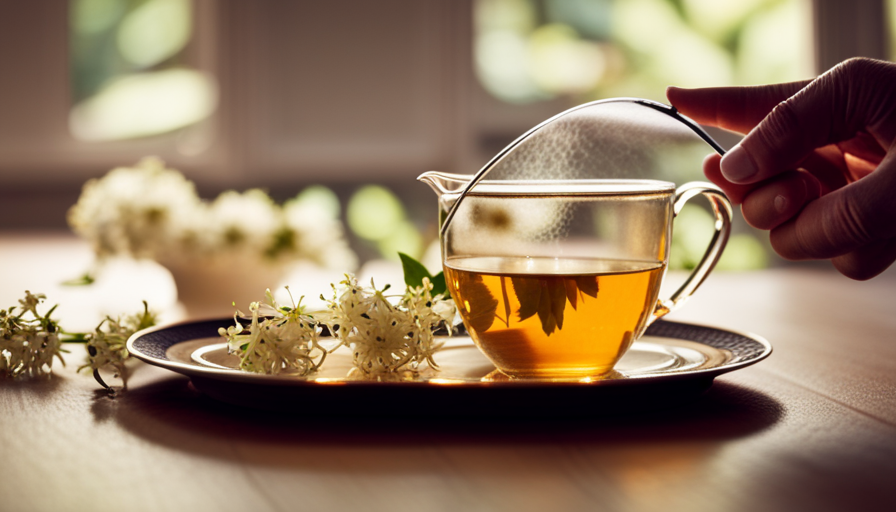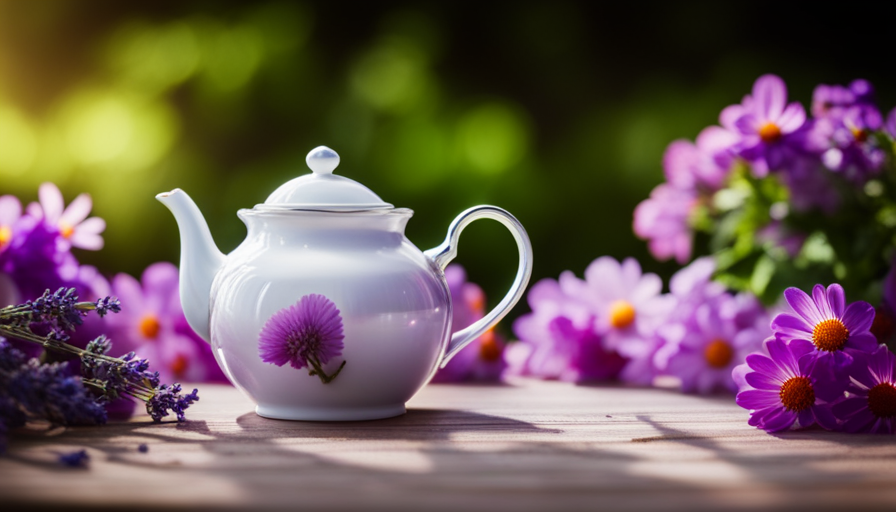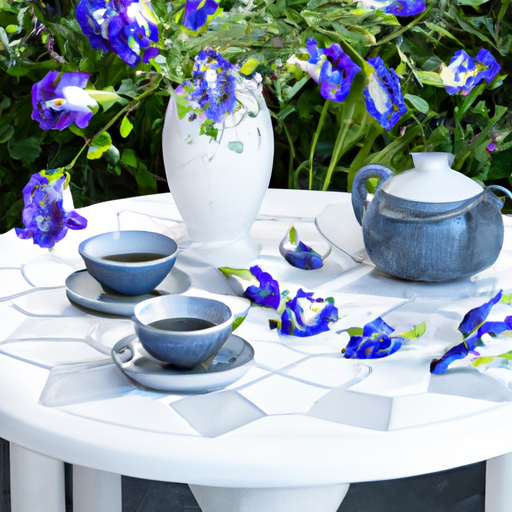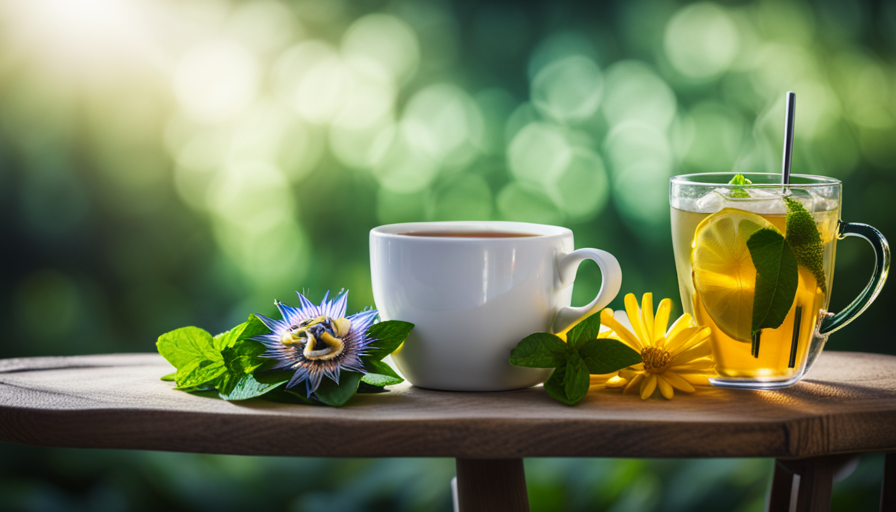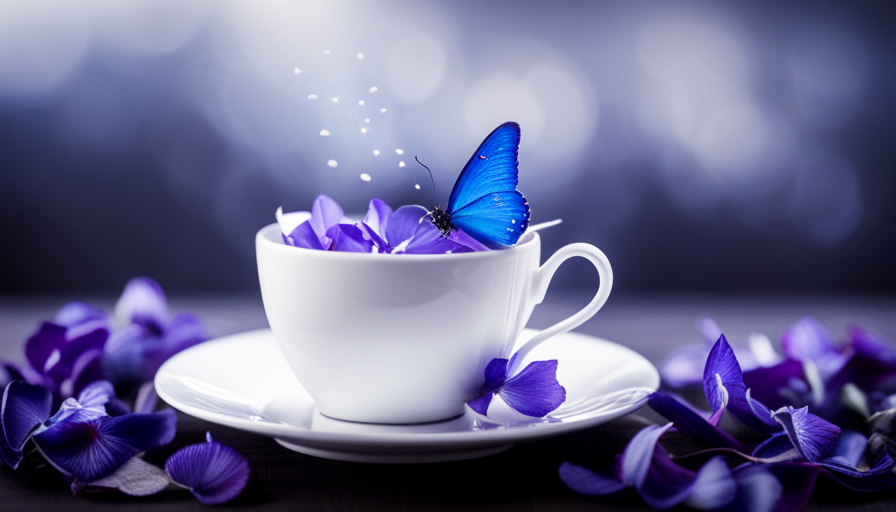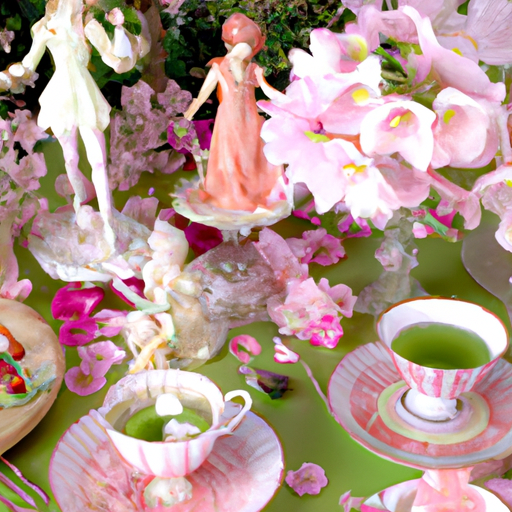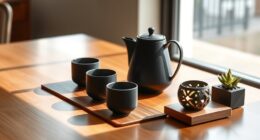Picture yourself in a peaceful garden, encircled by delicate and aromatic flowers. While the sun’s rays gently touch your skin, you pick a bunch of elderflowers, their ivory petals standing out against the lush leaves. These captivating blossoms conceal a mystery – the ability to turn a plain cup of hot water into a calming and beneficial potion.
Welcome to the world of elderflower tea.
In this article, I will guide you through the art of making elderflower tea, a delightful beverage with a rich history and numerous health benefits. From gathering and preparing the flowers to brewing the perfect cup, I will provide you with detailed instructions and insightful tips to ensure your tea-making journey is a success.
Join me as we explore the captivating world of elderflowers and unlock the secrets of this delightful brew. Let’s dive in and learn how to make elderflower tea, one sip at a time.
Key Takeaways
- Elderflower tea is made from the flowers of the elderberry plant during the elderflower season in late spring and early summer.
- To make elderflower tea, harvest fresh elderflowers in full bloom, remove any green parts or insects, rinse the flowers under cold water, and pour boiling water over them in a teapot or heatproof container.
- Elderflower tea has numerous health benefits, including antioxidant and anti-inflammatory properties, promoting kidney health and detoxification, relieving cold and flu symptoms, and promoting relaxation and better sleep quality.
- Elderflower tea can be customized with flavors and enhancements such as honey, lemon, fresh mint, ginger, lavender, chamomile, or rose petals, and can be served hot or cold.
Introduction to Elderflower Tea
Now, let’s dive into the wonderful world of elderflower tea and discover how you can easily make it at home!
Elderflower tea is a delightful herbal infusion that’s made from the flowers of the elderberry plant. It’s typically brewed during the elderflower season, which occurs in the late spring and early summer.
There are different types of elderflowers that can be used to make tea, including the European elderflower (Sambucus nigra) and the American elderflower (Sambucus canadensis). Both types have similar flavors and health benefits, so you can choose the one that’s readily available in your area.
To make elderflower tea, start by harvesting fresh elderflowers when they’re in full bloom. Gently remove the flowers from the stems and discard any green parts or insects. Rinse the flowers under cold water to remove any dirt or debris.
Next, place the flowers in a teapot or heatproof container. Boil water and pour it over the flowers, allowing them to steep for about 5-10 minutes. Strain the tea to remove the flowers, and it’s ready to be enjoyed!
Understanding the health benefits of elderflower tea, such as its immune-boosting properties and its ability to relieve cold and flu symptoms, can further enhance your appreciation for this delightful brew.
Understanding the Health Benefits of Elderflower Tea
First, let’s dive into the incredible health benefits you can experience when enjoying a cup of this delightful, nature-infused elixir. Elderflower tea is not only a refreshing beverage but also offers numerous health benefits.
This herbal tea is known for its rich antioxidant content, which helps fight free radicals in the body, reducing the risk of chronic diseases like heart disease and cancer. Elderflowers are also packed with anti-inflammatory properties, which can help alleviate symptoms of arthritis and other inflammatory conditions.
Moreover, elderflower tea is a natural diuretic, promoting kidney health and aiding in detoxification. It can also help relieve cold and flu symptoms due to its immune-boosting properties. The tea’s antiviral effects make it effective against viral infections such as influenza. Additionally, elderflower tea has been shown to have a calming effect on the nervous system, promoting relaxation and better sleep quality.
Elderflower tea offers a myriad of health benefits due to its antioxidant, anti-inflammatory, diuretic, immune-boosting, and calming properties. Incorporating this herbal tea into your daily routine can be a great way to support your overall well-being.
Now, let’s move on to the next section, where we will explore how to gather and prepare elderflowers for tea.
Gathering and Preparing Elderflowers
Let’s start by learning how to gather and prepare those beautiful elderflowers for a cup of delicious and soothing herbal infusion. Elderflower picking can be an enjoyable and rewarding activity. Here are a few tips to get you started:
- Look for elderflower bushes in sunny areas, preferably near water sources.
- Choose elderflowers that’re fully opened and have a strong fragrance.
- Use scissors or pruning shears to cut the elderflower heads, leaving a small portion of the stem attached.
Once you’ve gathered the elderflowers, it’s time to prepare them for tea. Start by gently shaking the elderflower heads to remove any insects or debris. Avoid rinsing them with water as it can wash away some of the beneficial compounds. Instead, use a soft brush or cloth to clean off any remaining dirt.
Now, it’s time to make the elderflower tea. Place the elderflower heads in a teapot or a heat-resistant container. Pour boiling water over the flowers, making sure they’re fully submerged. Let the mixture steep for about 10 minutes, allowing the flavors to infuse.
By picking and preparing elderflowers, you can enjoy the many health benefits of elderflower tea. Next, we’ll explore the process of drying and storing elderflowers to ensure you have a steady supply of this soothing herbal infusion.
Drying and Storing Elderflowers
To ensure a steady supply of elderflower goodness, you’ll want to dry and store those beautiful blooms just like you would preserve a treasured memory in a scrapbook. Drying elderflowers is essential to retain their flavor and aroma, and there are various techniques and preserving methods you can utilize. One common method is air drying, where you simply tie the elderflower stalks together and hang them upside down in a cool, dry place for about two weeks. Alternatively, you can use a dehydrator set to a low temperature, which speeds up the drying process while maintaining the flowers’ quality. Once the flowers are dried, it’s important to store them properly to prevent moisture absorption and loss of flavor. Airtight containers made of glass or metal are ideal for storing dried elderflowers. Label the container with the date of drying to ensure freshness. Now that you have your dried elderflowers, it’s time to move on to the next step: brewing elderflower tea.
| [Table] | Drying Technique | Preserving Method |
|---|---|---|
| Air drying | Hang upside down | |
| Dehydrator | Low temperature |
Transitioning into the subsequent section about brewing elderflower tea, let’s explore the delightful process of steeping these fragrant blooms into a soothing beverage.
Brewing Elderflower Tea
Indulging in a warm cup of fragrant elderflower infusion will transport you to a state of pure relaxation and bliss. Brewing elderflower tea is a simple process that allows you to fully enjoy the benefits of this delightful flower. Here’s a step-by-step guide to brewing the perfect cup of elderflower tea.
-
Start by boiling water in a kettle or pot. The amount of water you use will depend on how strong you prefer your tea.
-
Once the water’s boiled, remove it from the heat and add dried elderflowers to the pot. Allow the flowers to steep for about 5 minutes.
-
After the steeping time, strain the tea to remove the flowers. You can use a fine-mesh strainer or a tea infuser for this step.
-
Pour the brewed elderflower tea into your favorite mug and savor the delicate floral aroma and taste.
Elderflower tea offers numerous health benefits such as boosting the immune system, reducing inflammation, and aiding digestion. You can also experiment with different variations of the recipe by adding lemon or honey to enhance the flavor. These additions complement the natural sweetness of elderflowers and create a more complex and enjoyable tea experience.
In the next section, we’ll explore how to add flavors and enhancements to your elderflower tea.
Adding Flavors and Enhancements to Your Elderflower Tea
After brewing a delicious pot of elderflower tea, it’s time to take it to the next level by infusing flavors and enhancements. Adding additional ingredients to your tea can create a unique and personalized experience, elevating the flavors and aromas.
One popular way to enhance elderflower tea is by adding a touch of honey or a squeeze of lemon. These additions complement the delicate floral notes of the elderflower, creating a well-rounded and refreshing beverage.
If you’re feeling adventurous, you can experiment with other herbal infusions to create a more complex flavor profile. For example, adding a few sprigs of fresh mint or a slice of ginger can add a subtle hint of freshness and spice. You can also try infusing your elderflower tea with dried lavender, chamomile, or rose petals for a soothing and fragrant brew.
Remember to let the flavors infuse for a few minutes before enjoying your tea. This will allow the ingredients to fully impart their taste and aroma. Once your tea is infused to your liking, strain out any solids and pour the liquid into your favorite teacup.
Now, it’s time to move on to the next section and learn how to serve and savor your delightful elderflower tea experience.
Serving and Enjoying Elderflower Tea
Now that you’ve infused your elderflower tea with delicious flavors, how can you best savor and enjoy this delightful beverage? Here are some serving techniques to enhance your experience.
Firstly, consider serving elderflower tea hot or cold, depending on your preference. For a hot tea, simply pour the infused tea into a cup and enjoy it while it’s still warm. If you prefer a cold beverage, let the tea cool down, then refrigerate it until chilled. Serve over ice cubes for a refreshing summer drink.
To further enhance the flavor profile, consider adding a slice of lemon or lime to your elderflower tea. This citrus twist adds a tangy note and complements the floral taste of the tea. Additionally, you can sweeten your tea with a drizzle of honey or a sprinkle of stevia, depending on your dietary preferences.
Apart from the delicious taste, elderflower tea also offers numerous health benefits. It is known to have anti-inflammatory properties and can help boost the immune system. Moreover, elderflower tea has been used traditionally to relieve congestion and soothe a sore throat.
Serving and enjoying elderflower tea can be tailored to your personal taste preferences. The addition of lemon or lime, as well as sweeteners like honey or stevia, can enhance the flavor. Furthermore, the health benefits of elderflower tea make it an excellent choice for overall well-being.
Next, let’s explore the exciting world of elderflower tea recipes and discover new variations to try.
Exploring Variations of Elderflower Tea Recipes
To truly savor the diverse flavors of elderflower tea, why not explore the exciting world of different recipes and discover new variations to try? Elderflower tea not only offers a delightful taste but also provides several health benefits. Incorporating elderflower tea into your daily routine can help boost your immune system, reduce inflammation, and improve digestion.
When it comes to making elderflower tea, there are various infusion methods to choose from. One popular method is the traditional hot infusion, where dried elderflowers are steeped in hot water for several minutes. This method brings out the delicate floral flavors and aroma of the elderflowers. Another option is a cold infusion, where fresh elderflowers are submerged in cold water overnight, allowing the flavors to infuse slowly. This method creates a refreshing and light-bodied tea.
To give you some inspiration, here are a few variations of elderflower tea recipes you can try:
| Recipe | Ingredients | Method |
|---|---|---|
| Elderflower Lemonade | Elderflowers, lemons, sugar, water | Steep elderflowers in lemonade mixture overnight |
| Elderflower Mint Iced Tea | Elderflowers, mint leaves, honey, water | Combine all ingredients and let it chill in the fridge |
| Elderflower Green Tea | Elderflowers, green tea leaves, water | Steep elderflowers and green tea leaves together |
By exploring these different recipes and infusion methods, you can enjoy the full range of flavors and benefits that elderflower tea has to offer. Now, let’s move on to some tips and tricks for making the perfect cup of elderflower tea.
Tips and Tricks for Making the Perfect Cup of Elderflower Tea
Unleash the secrets to crafting an exquisite cup of elderflower tea with these expert tips and tricks. When it comes to infusing herbs, it’s important to choose fresh, high-quality elderflowers for the best flavor. Start by gently rinsing the flowers to remove any dirt or debris.
Next, prepare your water by bringing it to a boil and then allowing it to cool slightly. This’ll ensure that the water is at the optimal temperature for steeping the elderflowers.
When it comes to steeping techniques, there are a few different methods you can try. One option is to use a tea infuser or a tea bag. Simply place the elderflowers into the infuser or tea bag and then steep them in hot water for about 5-7 minutes.
Another option is to use a French press. Add the elderflowers to the press, pour in hot water, and let it steep for 5-7 minutes before pressing down the plunger.
To enhance the flavor of your elderflower tea, you can also add a squeeze of lemon or a drizzle of honey. These additions complement the delicate floral notes of the elderflowers and create a well-balanced cup of tea.
As you move on to the next section about frequently asked questions about elderflower tea, you’ll discover even more ways to elevate your tea-drinking experience.
Frequently Asked Questions about Elderflower Tea
Discover the answers to commonly asked questions about this exquisite herbal infusion, and elevate your tea-drinking experience to new heights.
- Is elderflower tea safe to drink during pregnancy?
- Can elderflower tea help with cold and flu symptoms?
- What are the potential benefits of elderflower tea?
- Are there any side effects associated with elderflower tea?
- How should elderflower tea be prepared for maximum benefits?
Elderflower tea is generally considered safe to drink during pregnancy, but it’s always best to consult with a healthcare professional before adding any new herbal infusion to your diet. This aromatic tea has been used for centuries to help with cold and flu symptoms, thanks to its immune-boosting properties.
Additionally, elderflower tea is known for its potential benefits in reducing inflammation, promoting digestion, and relieving anxiety and stress.
While elderflower tea is generally safe for most people, some individuals may experience side effects such as allergic reactions or an upset stomach. It’s important to start with a small amount and monitor how your body reacts to the tea. If you experience any adverse effects, discontinue use and consult with a healthcare professional.
To prepare elderflower tea, simply steep 1 to 2 teaspoons of dried elderflowers in hot water for about 5 minutes. You can also add honey or lemon for additional flavor. Enjoy this delightful and beneficial herbal infusion!
Frequently Asked Questions
How long does elderflower tea last when stored properly?
The shelf life of properly stored elderflower tea can vary depending on a few factors. When stored in an airtight container in a cool, dark place, it can last up to 2 years. However, for optimal flavor and quality, it’s recommended to consume within 6-12 months.
To ensure its longevity, avoid exposure to heat, moisture, and sunlight. Remember to always check for any signs of spoilage before consuming.
Can I use dried elderflowers to make elderflower tea?
Yes, you can use dried elderflowers to make elderflower tea. Although fresh flowers are typically preferred for their vibrant flavor, dried flowers can still provide a pleasant taste and aroma.
To make elderflower tea, steep 1-2 teaspoons of dried elderflowers in a cup of hot water for about 10 minutes. This herbal infusion is known for its numerous health benefits, such as boosting the immune system, reducing inflammation, and promoting relaxation.
Incorporating elderflower tea into your daily routine can be a great way to enjoy its benefits.
What are the potential side effects of drinking elderflower tea?
Drinking elderflower tea may have potential risks and can cause allergic reactions in some individuals. It’s important to be aware of these side effects before consuming this herbal beverage.
Allergic reactions may include itching, rash, or difficulty breathing. Other potential risks include gastrointestinal discomfort and low blood sugar levels.
If you experience any adverse reactions, it’s recommended to discontinue use and consult with a healthcare professional.
Can elderflower tea help with allergies?
Elderflower tea is known for its potential benefits in relieving allergies. It contains natural compounds that possess anti-inflammatory properties, which can help alleviate allergy symptoms such as sneezing, congestion, and itching.
Additionally, elderflower tea can boost the immune system and reduce the production of histamines, which are responsible for allergic reactions.
To enjoy the benefits of elderflower tea, try steeping dried elderflowers in hot water for about 10 minutes. There are also various elderflower tea recipes available that incorporate other ingredients for added flavor and benefits.
Is elderflower tea safe to drink during pregnancy?
Elderflower tea is generally safe to drink during pregnancy, but it’s advisable to consult with a healthcare professional before consuming it. While there are potential benefits of elderflower tea, such as its anti-inflammatory and immune-boosting properties, it’s important to note that there is limited scientific evidence specifically regarding its safety during pregnancy.
It’s always recommended to follow a balanced diet and consider alternative herbal teas or consult a healthcare provider for personalized advice.
Conclusion
In conclusion, making elderflower tea is a simple and rewarding process. By understanding the health benefits of elderflower tea, gathering and preparing the flowers, and properly drying and storing them, you can ensure a delicious and aromatic cup of tea every time.
Brewing elderflower tea requires patience and precision, but the end result is well worth it. Whether you enjoy it hot or cold, elderflower tea is a versatile and refreshing beverage that can be enjoyed in various ways. So, why not give it a try and experience the wonders of elderflower tea for yourself?

